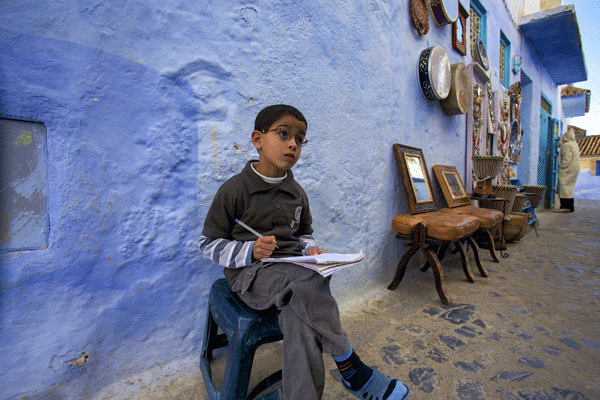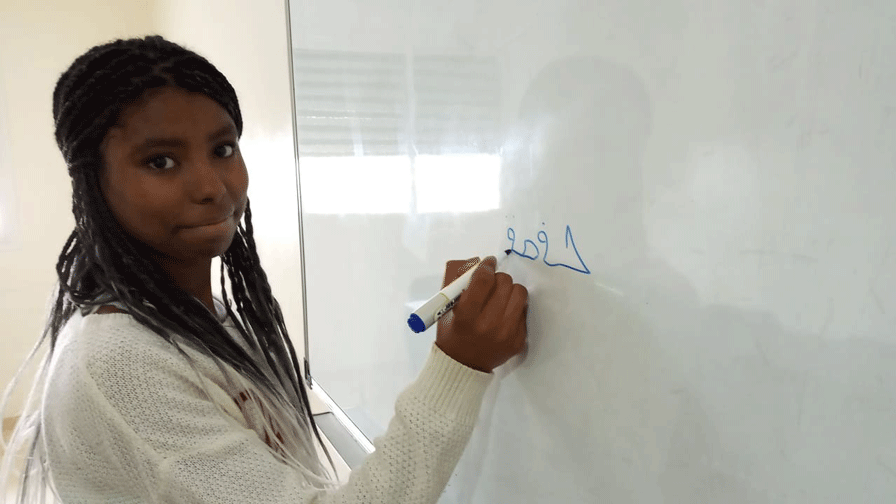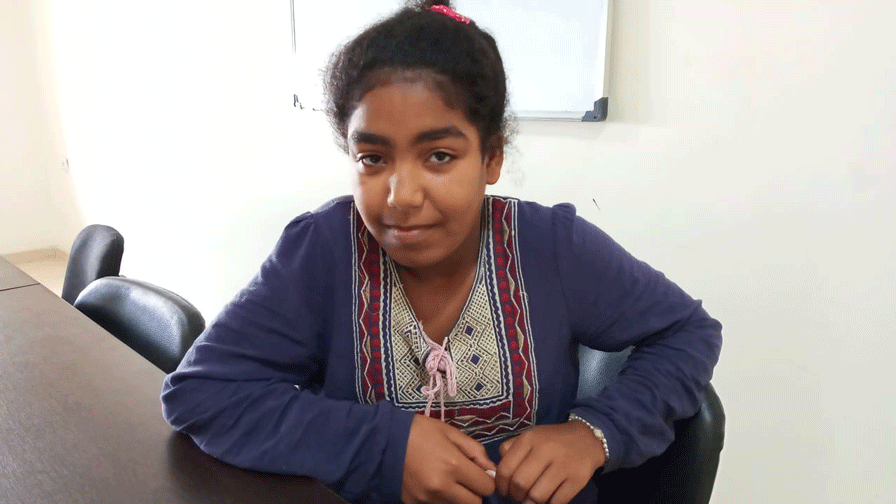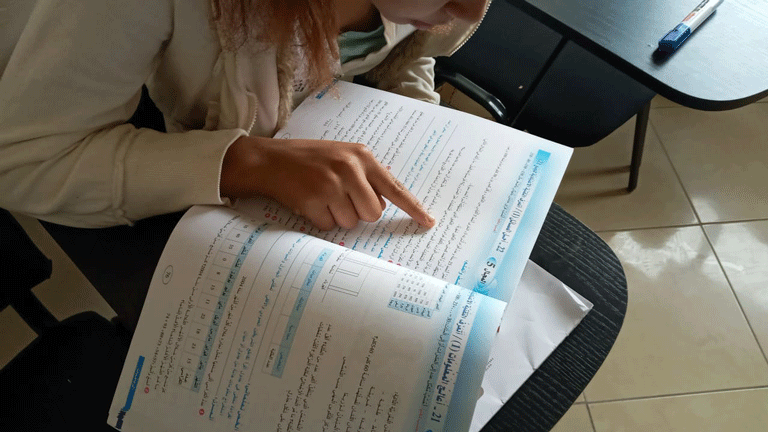In Morocco, Some children know nothing about what “school” means!

Magida Ait Laktawi
She gazed at a page in a book and put her little finger under words trying to do her best to spell them. “N-U-Z-Z-H-A,” she spelt. Salma, a 13-year-old girl, tried to put these sounds together into a word then pronounced it in low voice. “Nuzha,” (a picnic in English) she uttered.
In fact, Salma’s life has never experienced the luxury of picnics. Since she was an infant, she has been the daughter of a separated couple. Her parents’ divorce was the reason why she was deprived of education.
Moroccan children living in remote villages, on top of the Atlas Mountains, and in rural areas usually have no chance to finish their primary education; and this is somehow typical and “acceptable”.
However, when some children who live in Salé, a city located near Rabat, the capital city of Morocco, never attend school classes and are unknowledgeable about how a school looks like, this sounds odd and unusual.
Parents’ Divorce Resulted in Education Deprivation

“I have recurrently asked my mother about the reason why I was not registered at a school. She always replied the same: ‘We do not have the necessary paternity acknowledgment documents and this means you cannot be enrolled in a school’,” Salma said.
Instead of giving up, the girl sought to find someone who can teach her reading and writing until she finally succeeded last year, when she was 12, to find an association called “Al Amal” providing non-formal education.
Salma’s left eye suffers from strabismus. She has her eyelids swiftly lifted and lowered before narrating that at the age of 6 she accompanied her mother and headed to a school but the lack of family records and documents acknowledging paternity made her school enrolment be rejected.
The Ministry of National Education emphasizes that education is compulsory to school-age children and urges parents to register their children at the nearest public educational institution to their residence. Nevertheless, the ministry necessitates that a number of official documents be attached to the school enrollment application, on top of which are copies of the birth registration document, the vaccination certificate, and the parents’ ID cards.
According to official statistics, the number of children who have not been registered in the civil status records in Morocco up till 31 January 2018 reached 91,474 children.
The biggest number of unregistered children, 28,346, live in Rabat-Salé-Kenitra. The main reasons why a child is unregistered include the nonregistration of parents’ marriage contract, the expiration of the child’s delivery announcement term, or parents’ negligence in registration as a result of their ignorance about the laws.
Poverty and Need Made It Worse!

Salma has been deprived of the right to receive formal education at a public school. Her elder brother was offered help from a public society to help him continue his education before moving to live with his father. Both Salma and her brother have no official documents acknowledging paternity since their parents had taken no action to apply for these documents, especially after their divorce.
Today, Salma lives with her grandmother in the city of Salé after each of her parents got married and started new families and gave birth to new children.
It was not just the social and domestic problems that deprived Salma of the right to be educated, the difficult financial conditions, too, have contributed to worsening the matter. At the age of 11, the girl was sent to work in a house in the city of Mohammedia, 74 kilometers away, in exchange for USD103 per month.
Salma recalled memories of a month she spent helping to raise children at her age or younger. “Every morning, I used to watch the girls at that house going to school. I wished I could go with them. When I returned to my mother, I asked her why I did not go to school and the answer was the same I used to hear every time,” she sorrowfully said.
Her eyes suddenly shone and her tone of voice rose saying, “When I become a mother, I will do everything I can to make my children receive good education.” After uttering this hopeful expression, the girl had a wide, bright smile on her face — a gesture that turned into a plea addressed to all parents.
“I have lost my rights and so did all children in a case similar to mine. So, I call upon all parents to do their best to educate their children,” she said.
Hafsa and Malak, Two Sisters Suffering Deprivation
Divorce, poverty, and illiteracy are common circumstances under the force of which girls were crushed and deprived of any chance to go to school. The case of 13-year-old Hafsa and her 11-year-old sister, Malak, has not been better than those girls!
Hardly can Hafsa write her name. She held a pen on her hand and stood in front of the board to write her name slowly. It is her name and surname, only, which she knows how to write; and all other words remain unknown to her.
Her intense shyness did not stop her from expressing the profound sorrow she feels for not being enrolled in a school and for not being able to read or write up till now.
Even in the case of Hafsa and her sister, the lack of paternity acknowledgment documents was a main reason why their public school enrollment applications were rejected since their father had traveled having in his possession all family records.
“I do not see my father; he has not visited us over years. My mother works all week long as a domestic servant,” Hafsa said in a strained voice expressing shyness.
Although 13-year-old Hafsa is able to read only few letters, her dreams are considerably big: She dreams to become a university student and have a job after graduation to be able to financially support her mother and 6 siblings.
Her younger sister, Malak, firmly said she would have immediately joined a school if she had had the chance to be accepted in anyone.
Children Trapped within Four Walls
Hopes for correcting the situation of Hafsa and Malak may promise a better future for the two sisters; however, other children have been afflicted by diseases and their bodies weakened by disabilities that made them be forcibly trapped within four walls.
Nine-year old Mohammed Amin has been afflicted by a rare disease that resulted in his suffering from mental disability and quadriplegia. He lies on bed all day long having no ability to move, talk, or interact with others.
Mohammed’s mother, who refrained from disclosing her identity, said the symptoms of this disease began to appear since he was 6 months old. “He suffered from stunted growth and his reactions gradually slowed down accordingly. Later, we discovered he was suffering from a rare disease that was behind everything,” she explained.
Mohammed Amin has only one rehabilitation session per week during which he is given the sole chance to explore a world he is unknowledgeable about. For a child in his sensitive and difficult health and mental conditions, school enrolment remains a luxury.
Challenging all difficulties, the boy’s parents tried to provide their son with special care which schools cannot afford. They applied for allowing him to join Salé-based Centre National Mohammed VI des Handicapés, a medical and educational center, but they have to wait for long to receive a response since Mohammed Amin was put on the waiting list.
Misinterpretation of Laws Deprives Moroccan Children from Education

In Morocco, enrolment in educational institutions is compulsory and a right granted to all Moroccan children regardless of their situation, said Mr Hssain Oujour, Head of the Directorate for Non-Formal Education at the Ministry of National Education.
According to Mr Oujour, applicable laws do justice to the Moroccan children and require that parents enroll them in schools; yet, the problem lies in the misinterpretation of some administrative regulations by school principals which eventually leads to some children being education- deprived.
The ministerial official advised Moroccan families to be persistent and do everything they can to enroll their children in schools however their social, financial, or health conditions might be. He further cited examples of some students whose fathers’ identities were unknown but the children were able to temporarily attend classes until some associations would be able to undertake the fulfillment of the necessary administrative requirements later.
In conclusion, a child who has a special case may be the victim of the misinterpretation of laws and the ignorance of parents and their slackness in claiming the child’s right to receive education. This necessitates putting the Moroccan laws and the effectiveness of their application under scrutiny.
Mr Oujour does not know precisely the number of Moroccan children who were unable to enroll in schools due to financial, social, and health reasons. He affirmed that no accurate and specific figure is available in the state’s records.
Nevertheless, a report issued by the United Nations Educational, Scientific and Cultural Organization (UNESCO) revealed that 37,000 Moroccan children, that is 10 % of school-age children, did not enroll in elementary schools from 2010 to 2014.
Related Posts
The Stories and Names of Over 60 Children Executed in the Syrian Coast Massacres
The Tiny Hand team, in collaboration with Daraj, collected over 50 testimonies documenting the killing of 60 children during the massacres in the Syrian coastal region. To this day, the perpetrators have not been held accountable. These were “unidentified” killers — witnesses interviewed could not determine their factional affiliations, alongside others from armed civilian groups who arrived in the coastal area. Amnesty International has called for their prosecution, considering the events of March 6, 7, 8, and 9, 2025, to be war crimes….
April 30, 2025Abandoned Children: Foster Care in Northern Syria Amidst the War Years
All names in this investigative report have been changed to protect the safety and security of those involved and to ensure the identities of the foster families who have taken in some of these children remain confidential. Confidentiality is a fundamental principle in the success of this mission, as safeguarding the identities of both the children and the families providing care is critical, particularly in regions affected by ongoing conflict and instability….
March 12, 2025


